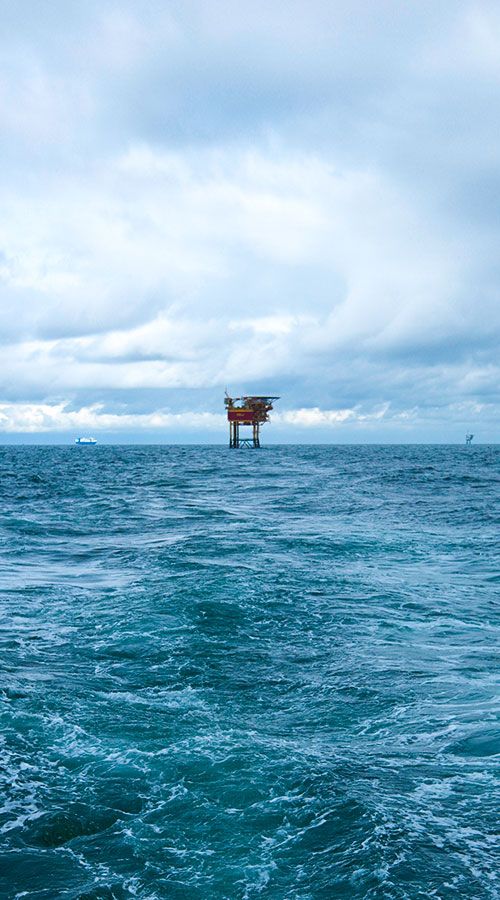Wintershall Dea investigates conversion of north sea natural gas pipelines for CO2 transport


- High potential for geological storage of CO2 in the southern North Sea
- Necessary pipeline infrastructure already exists
- Wintershall Dea starts research project with Regensburg University of Applied Sciences
Wintershall Dea, Europe's leading independent gas and oil company, is working with the OTH Regensburg University of Applied Sciences to explore how existing natural gas pipelines in the southern North Sea can be used for future CO2 transport. Initial calculations paint a positive picture. Results obtained so far suggest that the offshore pipelines could be safely and efficiently repurposed for transport of liquid CO2. As the study progresses, technical feasibility will be tested, and certification will take place.
There are over 4,800 kilometers of pipelines in the southern North Sea, of which 1,200 kilometers are operated by Wintershall Noordzee, a 50:50 joint venture between Wintershall Dea AG and Gazprom EP International B.V. Parts of this network could be used for CO2 transport. Wintershall Noordzee also operates numerous depleted reservoirs. These are potentially suitable for storing CO2, which can play an important role in climate protection. The Dutch Continental Shelf offers enormous potential: experts estimate that around 800 million tons of CO2 could be stored(1) there. That’s enough to store the entire annual emissions of all Dutch industry thirty times over, or by comparison, eight years of German industrial emissions, based on 2018 figures(2).
"We are optimistic about the further investigations. Our calculations already show that existing offshore pipelines could be well suited for transporting liquid CO2," says Klaus Langemann, Senior Vice President of Carbon Management and Hydrogen at Wintershall Dea. Together with industry and research partners, Wintershall Dea has developed innovative calculation models that enable completely new insights in this technological field. The next step will be to demonstrate the reliability of the evaluation process and prove the feasibility experimentally.
Companies with unavoidable process emissions – for example those from the steel, cement, or chemical industries – will soon be dependent on underground offshore storage sites for the capture and safe storage of their CO2 emissions (CCS - Carbon Capture and Storage). Moreover, the CO2 produced during the production of “blue hydrogen” from natural gas can also be safely stored in this way.
"Wintershall Dea is investing in CCS because we are convinced that it is a safe and affordable technology for decarbonisation. We have the technological know-how and the depleted offshore reservoirs required for CCS, as well as access to the pipeline network for transport," says Klaus Langemann. If existing natural gas pipelines can be used for this purpose, this not only improves the economics of CCS projects, but also contributes to the sustainability of many industrial sectors and their products.
For Wintershall Dea, the study with OTH Regensburg is part of the company's far-reaching measures to drive forward the energy transition. In November 2020, Wintershall Dea set itself climate targets. These include the reduction of Scope 1 and 2 greenhouse gas emissions in all own-operated and non-own-operated exploration and production activities (on an equity share basis) by 2030. Beyond 2030, the company intends to meaningfully reduce their net carbon intensity, including Scope 3 emissions. Here, CCS and hydrogen will be key technologies.
(1) Independent assessment of high-capacity offshore CO2 storage options, TNO, Delft 2012
(2) https://www.iea.org/data-and-statistics/data-browser
About Wintershall Dea
Wintershall Dea is Europe’s leading independent natural gas and oil company with more than 120 years of experience as an operator and project partner along the entire E&P value chain. The company with German roots and headquarters in Kassel and Hamburg explores for and produces gas and oil in 13 countries worldwide in an efficient and responsible manner. With activities in Europe, Russia, Latin America and the MENA region (Middle East & North Africa), Wintershall Dea has a global upstream portfolio and, with its participation in natural gas transport, is also active in the midstream business. More in our Annual Report.
As a European gas and oil company, we support the EU's 2050 carbon neutrality target. As our contribution we have set ourselves ambitious targets: We want to be net zero across our entire upstream operations – both operated and non-operated – by 2030. This includes Scope 1 (direct) and Scope 2 (indirect) greenhouse gas emissions on an equity share basis. In addition Wintershall Dea will bring methane emissions intensity below 0.1 per cent by 2025 and maintain zero routine flaring of associated gas in its operations. The climate goals are to be achieved through portfolio optimization, emissions reduction through more energy efficiency, investments in nature-based compensation solutions and in future technologies such as hydrogen and CCS. You can find more about this in our Sustainability Report.

